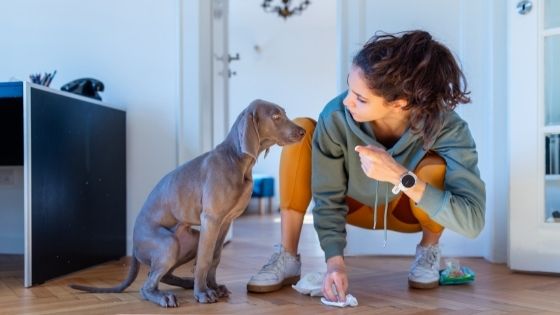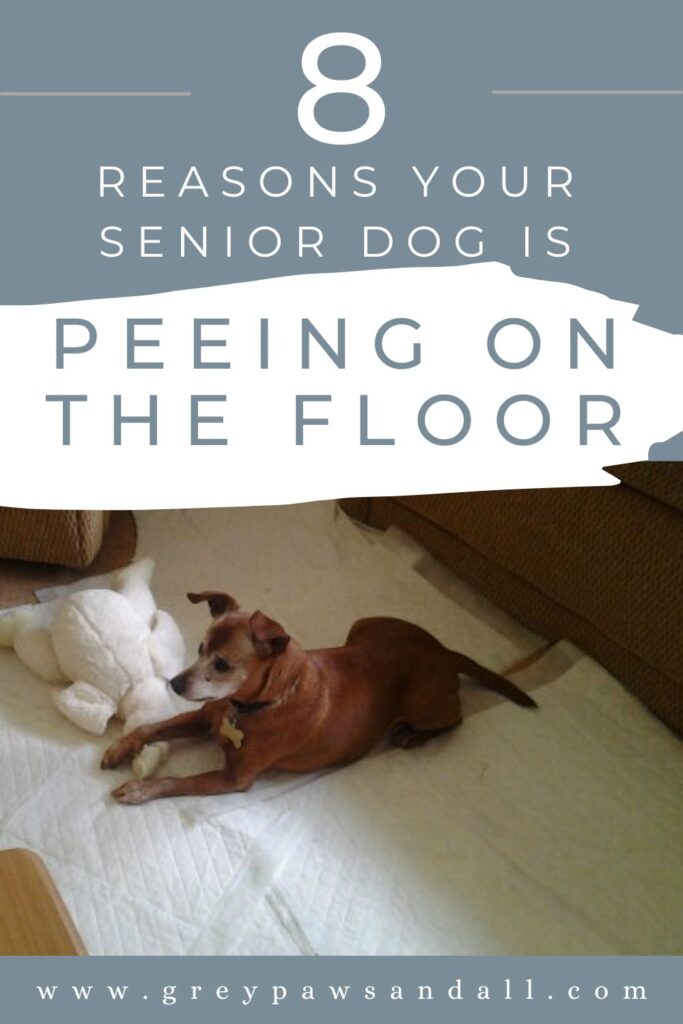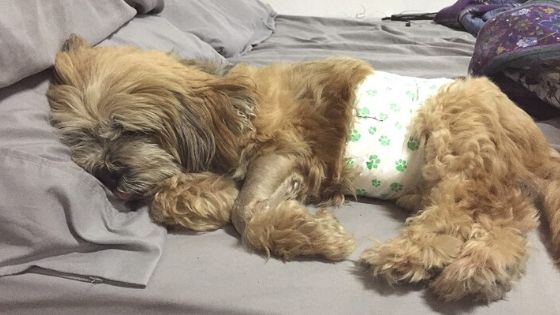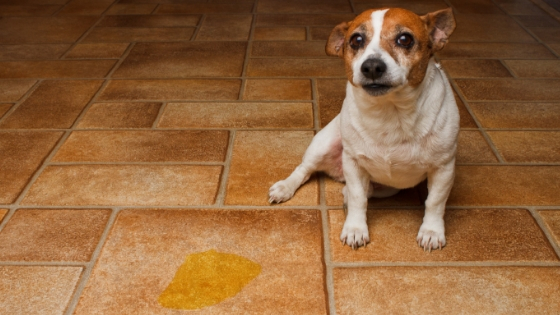You walk into the house and, like radar, you zoom in on the big pee stain on your carpet. Believe me when I tell you, I’ve been there more times than I can count. If they would at least pee on your bare floors, it would be easier to clean right! How about waking up in the middle of the night for a quick bathroom break, stepping on a wet pee pad, then fumbling around in the dark for a clean pair of socks?
Some of the reasons dogs pee in the house include being left alone too long without a walk, urinary tract infection, anxiety or diabetes.
**There are affiliate links in this post, which means if you buy something I may receive a small commission. This has no effect on the price you pay.**
Everything you wanted to know about diapers…. “The Essential Guide to Diapers for Your Old Dog“
Three Piece of Advice Before we Start
Never hit or yell at your dog – It is never acceptable, and definitely not the way to teach a dog anything. He may develop fear or anxiety, which can lead to other behavior issues. He may even be afraid to pee when you’re around and that includes on his walks, so he’ll find quiet places to do it in the house.
Thoroughly clean the stain – You may remove the stain but the smell often remains, and that may tell your dog it’s a good place to pee. Be sure to find a good cleaner that removes odors as well. Recommendations can be found below.
Don’t give your dog away – Unfortunately, many dogs end up in shelters due to issues that can be treated or at least well managed. Give yourself and your dog a chance. Read through this post, discover the reasons why your dog may be peeing and let’s figure out, together, what we can do to help.
Has Your Dog Suddenly Started Peeing in the House?
If your dog has been fine for the weeks, months or even years you’ve had him but has suddenly started peeing in the house, that needs to be taken seriously. I’m writing this as a separate section because if this has happened suddenly, it needs to be addressed first.
It’s possible your dog has developed a UTI (urinary tract infection), which requires medication. There are several medical conditions that cause his behavior in senior dogs, so I recommend you see your vet as soon as possible.
Make notes to bring to your vet that include information such as:
- How long it’s been going on
- How many times a day
- Is it always in the same place
- Have there been any changes in your home lately – Moving? Being left alone for the first time?
- Any other behavior changes you’ve been noticing that have you concerned
This information will not only make your appointment more productive, it could help your vet make a diagnosis, or at least an educated case before tests come back.
I recommend bringing a urine sample with you, because you know your dog isn’t going to pee when you need him to!! My vet says a sample should be no more than 2 hours old from the time you collect it until it’s given to your vet, but yours may have different instructions so ask before you go.
Your vet should be able to test the sample in house for at least the basics, even if he does need to send it out to get a more complete picture. He could get a good enough idea of what’s going on so he can start treating your dog right away.
Reasons Why a Dog Pees in the House
- Not getting enough walks//too long between walks
- Urine marking
- You rescued a senior dog that is not house trained or needs a refresher course
- Boredom
- Attention
- Submission or excitement urination
- Anxiety/separation anxiety
- Health problems such as a UTI, incontinence, seizures, diabetes, kidney issues, Cushing’s, dementia

How to Stop a Dog Peeing in the House
Not getting out enough walks/too long between walks
If you’ve determined this to be the reason, the solution is simple. Your dog needs to go out for more walks and/or pee breaks in between. If this is happening because he’s being left alone too many hours a day, a dog walker or doggy daycare will take care of that. Alternatively have a family member, friend or neighbor take him out, or have him spend time at their place.
Urine marking
Urine marking is not the same as peeing or having accidents in the house, even though the end result is still wet floors and carpets.
Some of the situations that can cause a dog to start marking would be:
- A new baby in the home
- They see a dog outside and feel they must mark their territory
- Lacks confidence
- Staking his claim to items or territory he believes belong to him
Not house trained/needs a refresher course
- You’ve recently adopted a dog who was in the shelter so long he needs a refresher course
- You’ve recently adopted a dog who was never house trained
- Your dog has free access to the backyard so you haven’t felt the need
- You don’t know where to start
The good news is, this is something you can start doing right now and here are some tips that work for dogs of all ages.
House training tips
These are house training tips, but I only mention peeing because that’s the focus of this article.
♦ During the training period pee breaks will be scheduled. It’s not a time for him to play, so keeping him on a leash will prevent him from wandering off. When you first bring your senior dog home, it’s not a bad idea to take him out every 1-2 hours. Ideally you want to avoid an accident from ever happening, but you’ll be showing him or her there are enough opportunities to go out to pee, he doesn’t have to do it in the house. That’s the goal anyway. It won’t take long for you to figure out how long he can wait, and take him out earlier than that…just in case!
♦ Pee breaks will always happen in the same spot of your choosing. It can be in the front yard, but it’s best if there are few distractions so if you have a backyard that would be best. If you don’t, the front is fine.
♦ You will need to decide on a word, known as a cue when he pees. Over time he will understand the association between the word and the action. Keep it simple, one word is best, I say “go pee.” You will be able to tell him to “go pee” and he’ll know what you’re talking about.
♦ Every time he pees outside, reward him. It could be food, attention or a favorite toy; whatever you thing he will most likely respond to.
NOTE: You must reward him immediately, or he won’t learn to make the connection between the action and the reward.
♦ This is something we like to advise puppy parents to do, but decide if it makes sense for your old rescue. It’s not possible to keep an eye on your dog at all times, so attaching a leash to him and then tethering it to your belt or belt loop will ensure he doesn’t sneak off and pee somewhere. It will also give you the opportunity to see what kind of signs he starts exhibiting when he needs to pee, so you can take him out before anything happens. This will only be necessary until he’s trained (sorry if that was obvious.)
Boredom
It’s possible this could be the cause of your dog peeing in the house. He may have done it in the past and discovered it helped relieve his boredom. If this turns out to be the cause in your case, take a look at his walk schedule and see if he’s getting out enough. Leaving him in the backyard doesn’t count!! Do you schedule play time for mental stimulation as well? If not, take time each day to play with him, buy or make some treat dispensing or puzzle toys, all of which will keep him occupied and end the boredom peeing.

Attention
Your dog peed in the house, and got your attention. He may have decided that no matter how you reacted, he was happy enough to get any attention. Your dog’s behavior has now been reinforced. In this case the best course of action is to ignore him when this happens, and be sure everyone else in your household does the same. When he sees he no longer gets the attention he’s looking for, that problem should resolve itself.
I do suggest you question why your dog is after the interaction. Have things changed recently and you no longer spend as much time with him? If that’s the case, please try and set aside at least a few minutes each day where you just spend time together.
Submission or excitement urination
It’s pretty common for puppies to pee when they’re nervous or excited, but they typically outgrow it over time. Some dogs however do not, and perhaps your rescue is one who hasn’t!
Submissive urination can occur when a dog has had a traumatic past and is scared of being approached (a situation I’m familiar with when we rescued a puppy mill dog) or is being yelled at.
Excitement urination usually happens when a dog is playing too roughly or is so happy when he greets a person or another dog.
Here are a few things you can do that will work, whether you’re dealing with submissive or excitement urination.
- Don’t pay attention to your dog when he’s in a highly excited state, as that will increase the chance he’ll pee. Wait until he’s calmer
- Avoid eye contact with a dog that has been abused
- When socializing your dog or puppy, expose him to new situations gradually so it’s not so overwhelming (I added this in case you’re also dealing with puppy training or know someone who is)
- If your dog gets excited when visitors come, ask them to not pay much attention to him when they first arrive, let him calm down first
Anxiety/separation anxiety
Changes in schedules, a move to a new home, and another family member (2 legged or 4) joining the household are just a few examples of anxiety producing events. Each one could easily cause even the most well trained dog to have accidents in the house.
How you handle it depends on the reason, but generally speaking try and do the best you can to stick with your dog’s schedule. Carve out time each day to spend with him, and be sure he still gets the same amount of physical exercise and mental stimulation he was getting before things changed. If, for whatever reason that has become more difficult for you to do, please find someone who can help. A dog walker can take your dog for solo outings or in groups where he can interact and have fun with other pups, or send him to to doggy daycare on particularly hectic days. If budge is a factor, how about a family member, friend or neighbor who can help. Maybe offer to do something for them in exchange for dog sitting, like bartering.
Health problems such as a UTI, incontinence, seizures, diabetes, kidney issues, Cushing’s, dementia
Many, but not all of these conditions can be associated with senior dogs, but please keep reading no matter how old your dog is.
UTI
A UTI (urinary tract infection) is a common cause of peeing indoors, and signs your dog has one are: difficulty peeing, licking the area and blood in the urine. Bladder cancer can also present with the same signs. You’ll need to get your dog to the vet as soon as you can, and ask about bringing a urine sample with you to save time. Your vet will discuss the best treatment options based on results, but UTIs typically require a course of antibiotics.
Incontinence
Incontinence occurs when a house trained dog cannot control his bladder. Your dog dripping urine is a common indicator, and a sign of that would be skin redness and irritation in the area. Treatment will depend on the cause, but Incurin and Proin are two options. Many dog parents, especially those with older dogs turn to doggy diapers and find them a huge help. There’s more information about that below.
Seizures
Seizures in dogs is a massive topic, one too complicated for this post, but it’s important to mention because it is relevant. If your dog is having a seizure you may see:
- Uncontrolled twitching
- Trembling
- Falling over
- Pacing
- Disorientation
- Drooling
- Vomiting
- Loss of bladder and/or bowel control
If a dog’s condition is severe enough, he will be put on medication to help control the seizures, otherwise vets don’t usually recommend anything. If that’s the case with your dog, there isn’t anything you can do to stop him having an accident, just get yourself a good cleaner. You’ll find some recommendations at the end of this post. You’ll also want to think about diapers and pee pads, which we’ll talk about in a moment.
Diabetes, Kidney issues, Cushing’s and dementia
The reason I’ve lumped all of these together is because peeing in the house is one of the common symptoms associated with all these diseases. The reasons may differ but this sign is common. In some cases, once the condition is diagnosed and treatment started, the peeing indoors will stop. In others the frequency may be reduced but can still occur.

Are Doggy Diapers and Pee Pads the Best Solution Overall?
In spite of treatment, it’s possible your dog will pee in the house at times. In those cases you may find doggy diapers and pee pads are your best solution. I know of so many people who use diapers and they’re thrilled with how effective they are. There are a lot of different types and styles, disposable and washable, so it may be a case of trial and error until you find what works for you. I will list a few recommended brands below. You do need to change them regularly, leaving your dog wearing a wet diaper can cause skin irritations.
Pee pads are another fabulous solution, but it obviously doesn’t look great if that matters to you. You can teach your dog to pee on a pee pad and just keep a couple down out of the way. If your dog is blind or has mobility issues and can’t walk too far, you may need to cover a larger area or, like me, cover the entire floor.
Not the best look but it was better than having pee stained carpets!
Training a dog to use a pee pad
The tips below are typically used for younger dogs, so feel free to modify them as needed for your older pup.
Place a pee pad somewhere he will have privacy but easy access.
If you haven’t done this yet, pick a word (known as a cue) you will use that means it’s time to pee. You can use “potty” or just plain “pee.”
When you can’t supervise your dog’s movements, put a leash on him and attach it to your belt or belt loop and keep him with you. When he looks like he needs to pee (in time you’ll begin to recognize the signs but it could be circling, restlessness, trying to get your attention, going to the door) take him straight to the pee pad and give your cue. Keep treats with you because as soon as he pees you must immediately reward him.
Don’t wait until your dog has to go so badly he’s barking at you. When he first gets up in the morning is the perfect time to take him to the pee pad, then every couple of hours or as often as he seems to need to go.
For times when you aren’t home, leave him in a room or sectioned off area, and cover the floor with pee pads. At least if he has to go, it won’t be on your carpet.
These are senior dog care club member recommendations…
Simple Solution Disposable Diapers
Pet Magasin Washable Male Diapers
Frisco Training and Potty Pads
The Best Dog Urine Stain and Odor Remover
I spoke to the “experts” – the members of my FB group for senior dog parents, since this is something most of them deal with on a regular basis.
Here are their recommendations:
- Carbona (available in WalMart, Target and supermarkets)
- Nature’s Miracle Enzymatic Urine Destroyer
- Resolve Urine Destroyer
- Odormute
- FurryFreshness – visit their website, can’t find it on Amazon
- My Pet Peed – visit their website, can’t find it on Amazon
- Kids ‘N’ Pets – currently out of stock on Chewy and Amazon, but do a search in your area
Has your dog started peeing in the house? What was the reason and have you resolved the issue? Sharing helps others so please let us know about your experiences in the comment section below.
If you’re looking for a community of senior dog parents, a place where you can find helpful tips, support and people who “get it” please join my FB group Senior Dog Care Club
I help senior dog parents struggling with anticipatory grief and quality of life issues by offering practical tips, advice and one on one support. I am also a Certified Pet Loss Grief Support Coach, helping you navigate through your pet loss journey.
Visit my services page to book a FREE 20 minute discovery call, or email me (Hindy) at hpearson141@gmail.com if you have any questions.
I’ve been rescuing and caring for senior dogs since 2009. From vision and hearing loss to obesity, dementia, kidney disease, liver issues, cardiac problems, Cushing’s, mobility challenges and more, you could say I’ve dealt with and learned a lot! In addition to my hands on experience, I’ve taken many courses and earned several qualifications to keep learning how to help senior dogs and they include: Senior Dog Enrichment, Understanding Canine Anxiety, Care of the Senior Pet and I’m a Certified Pet Loss Specialist.

